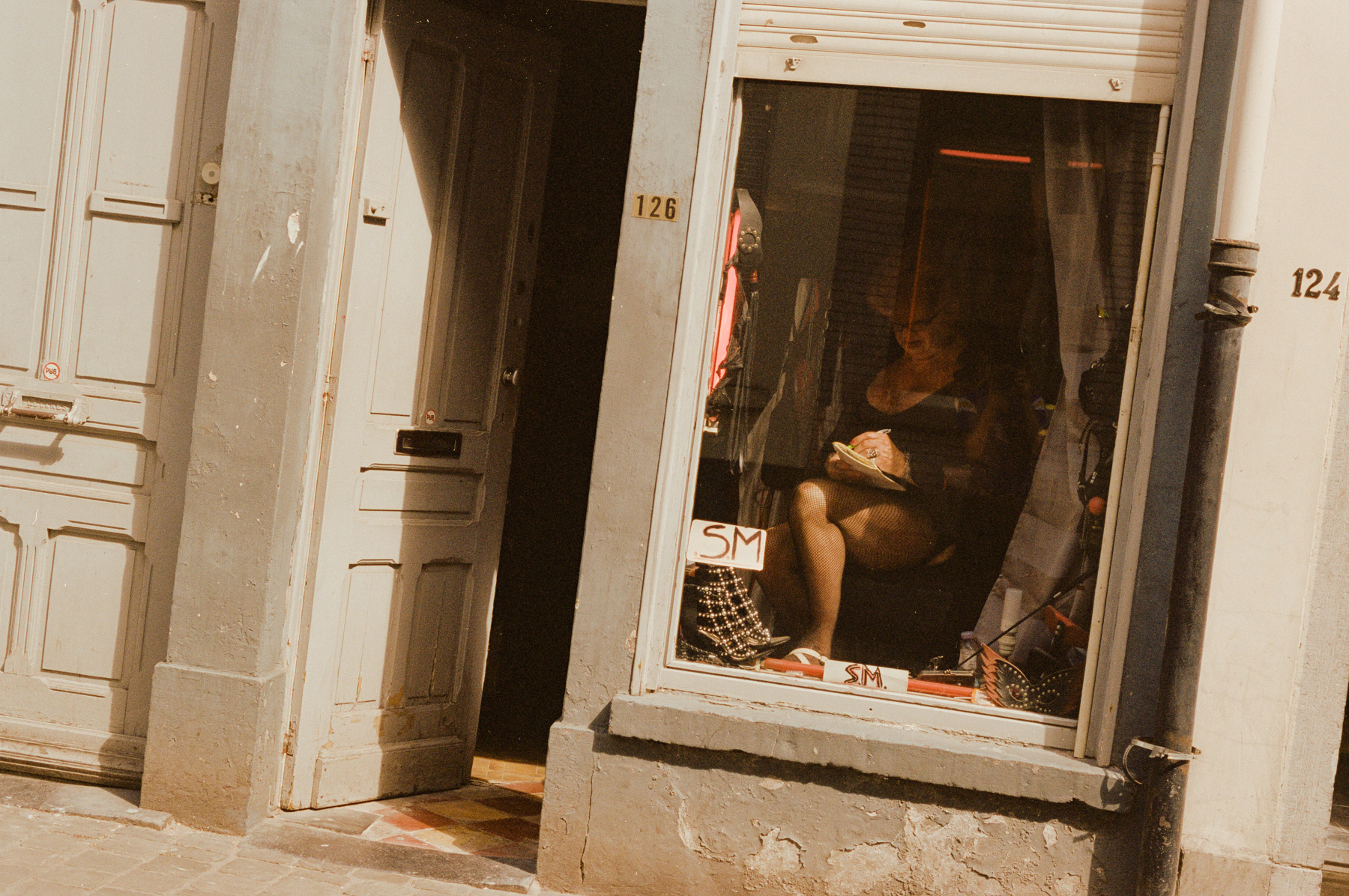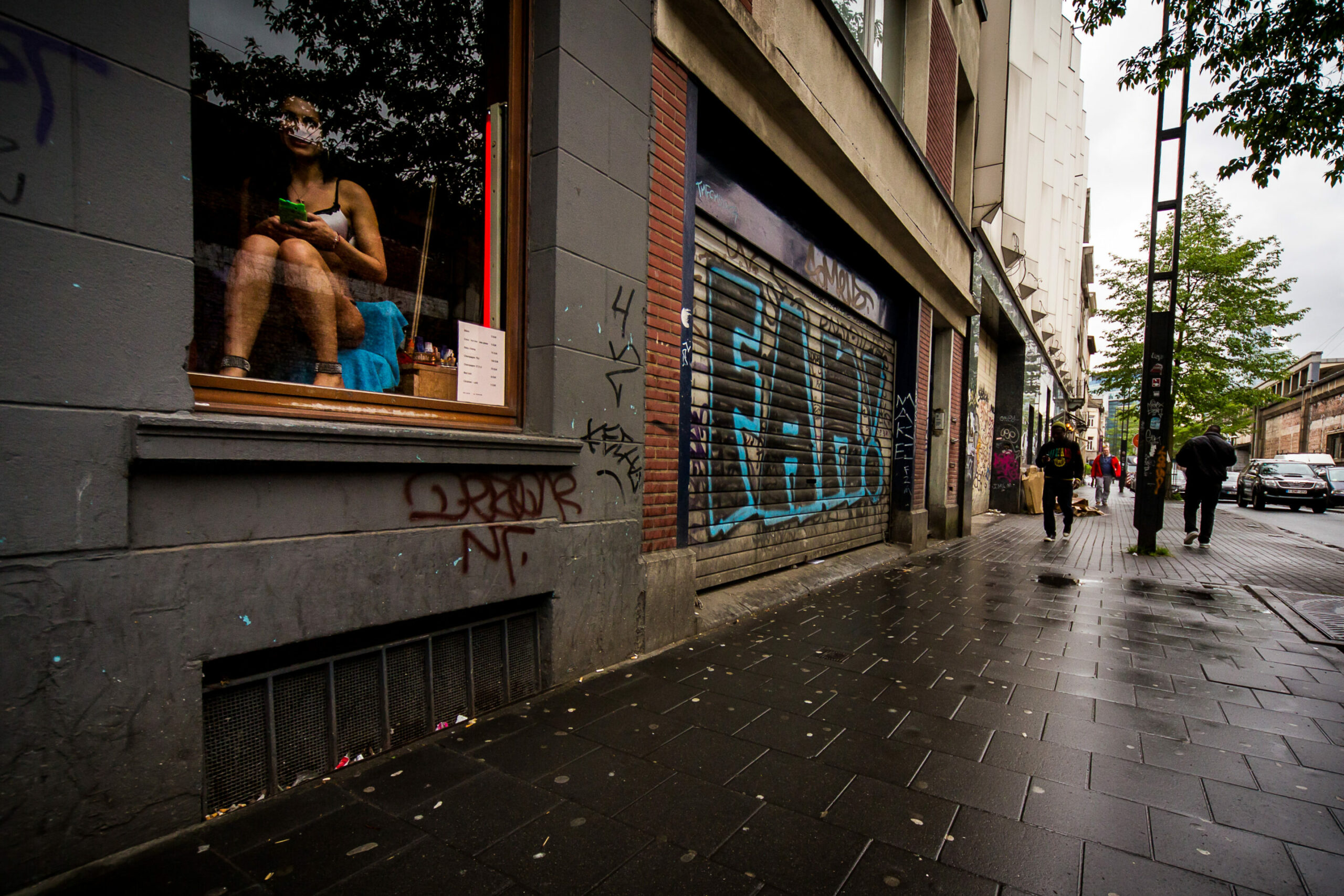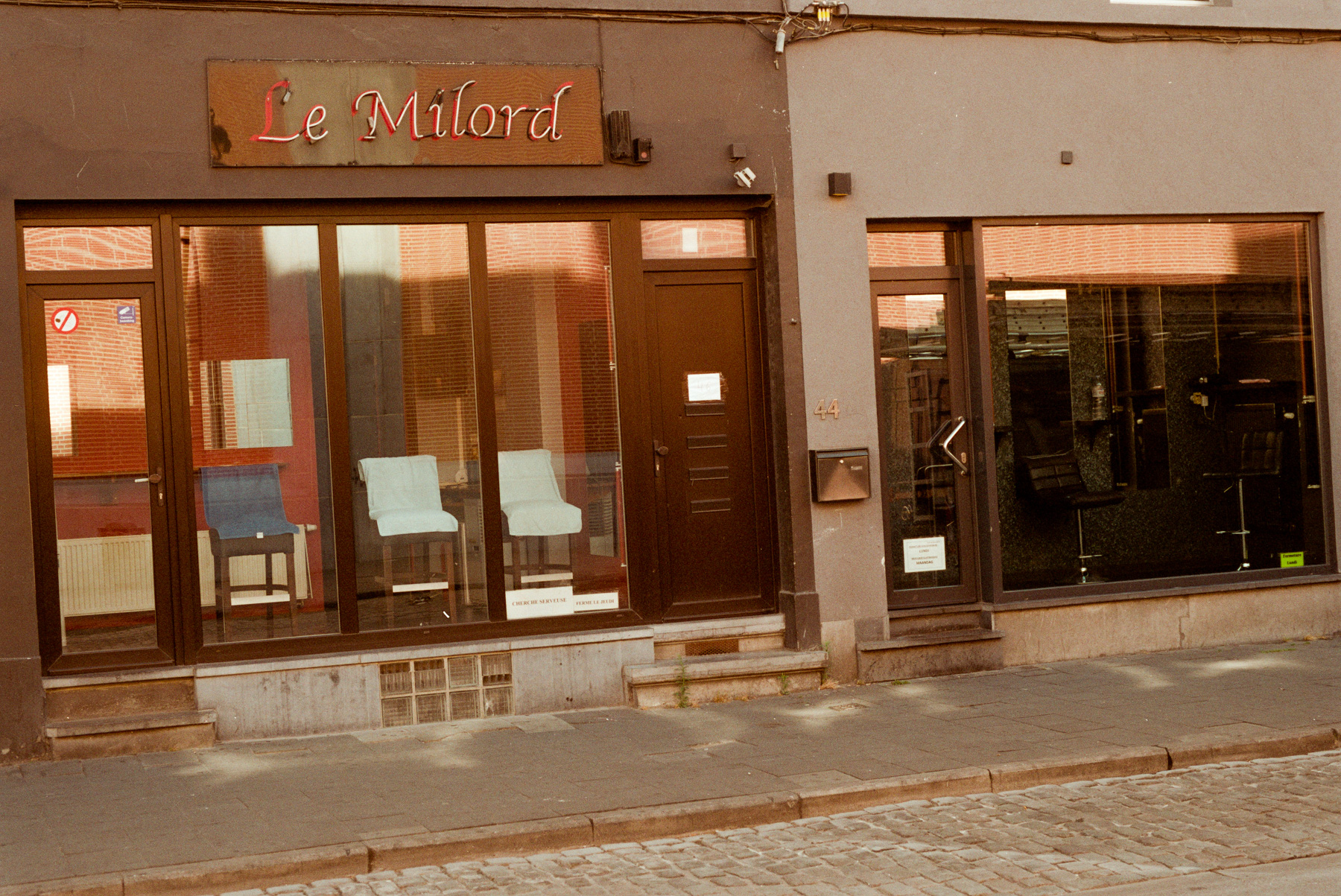Belgium became the first European country to decriminalise sex work when its parliament approved a new sexual penal code on March 18, 2022, a bold political choice aimed at reducing stigma and giving sex workers access to social rights and employment law.
However, for sex workers themselves, life remains largely unchanged. Despite decriminalisation, many still face significant risks, including violence and limited access to healthcare – reflecting a gap between legal reforms and the realities of life on the street.
“It’s been what, two years now?” says Deedee. The 50-something trans, red-haired sex worker waits for clients on her porch on Rue Linné, in Saint-Josse-ten-Noode, one of the few streets in Brussels' prostitution district.
Deedee’s voice has cheerful tone when calling out a man walking past her window shop; she is a familiar face in the neighbourhood. But she notes that decriminalising prostitution in Belgium has failed to lift sex workers out of their precarious situation. Access to social protections remains hindered by discrimination.
“I’m not too pessimistic about decriminalisation as I'm nearing the end of my career,” she says smilingly. “But I’m concerned for the next ones. For all the migrant sex workers around here. I’m not expecting tremendous changes for them, unfortunately.”

Dedée doing a crossword while waiting for clients to come.
She is echoed by Marie Lesperance, a 67-year-old Liège-born woman who started sex work 36 years ago. “Since the so-called decriminalisation, I haven’t noticed many changes, nor have my peers,” Lesperance laments.
After working as a factory worker, a waitress in a brasserie and a precious metals dealer, she eventually lost her job and ended up in the Brussels prostitution industry, selling her sex services in a window shop in the Rue D’Aerschot.
Now retired from prostitution, Lesperance remains active as a sex workers' rights advocate and is still close to her former peers. “Everyone turns to prostitution for money reasons. Don’t kid yourself,” she says. “They say you can now advertise your business or rent a shop window for prostitution. But we’ve always been able to do so. It’s now legal to open a bank account, but bankers still turn sex workers down without providing any reason.”
From tolerance to recognition
The sexual penal law reform revised or introduced several concepts such as consent, incest and rape. Media headlines mostly drew attention to the decriminalisation of prostitution as it ended decades of blurry tolerance policy with a regulatory framework.
Before the reform, it was not illegal per se to offer or pay for sexual services in Belgium. But third parties – namely all those who make prostitution possible, like bar owners, landlords, accountants and drivers – risked being criminalised, which condemned the entire sector to illegality, (even if red-light districts have long been part of most big Belgian cities).
The legal database Strada lex says the new law is not a true decriminalisation, and critics of the law, such as the Brussels-based sex workers association isala, say it has instead decriminalised third parties. In turn, this has led to a decriminalisation of pimping.
“The previous system was hypocritical, and it denied sex workers fundamental rights while opening the door to exploitation,” says Daan Bauwens, head of Utsopi, the Belgian union of sex workers. “We’ve never said and will never state that sex work is just like any other job. But it needs to be considered as work to give sufficient protection to the people working in this sector.”
The sex workers union has its headquarters on the Rue d’Aerschot, in the heart of the Brussels red-light district. Utsopi and other grassroots organisations such as Espace P have teams of social workers operating in Brussels and in major Walloon and Flemish cities, offering counselling, legal aid and health products to sex workers.
Espace P coordinator Isabelle Jaramillo says decriminalisation is a step towards the recognition of sex workers’ rights: “Third parties are no longer considered as pimps as long as no unreasonable profits are made,” Jaramillo says – although she adds that this concept has yet to be defined in case law. “Another huge step with this reform relates to advertising. It remains prohibited except in the cases provided by law. Meaning that window prostitution as well as sex work promotion taking place online can be maintained.”
Human trafficking
Both Espace P and Utsopi say the reform could expand the online sex work market. But decriminalising online promotion of prostitution also plays a crucial role in combating human trafficking,” says Utsopi’s Bauwens. “It’s an essential tool for authorities to uncover cases of abuse.”
Among other requirements, the decree should mandate websites to monitor each advertisement, report potential human trafficking or child prostitution, and implement tools to alert sex workers about problematic clients and provide information about support organisations in Belgium.
The decriminalisation was followed by other key legal measures. In May 2024, the Belgian parliament approved the labour law for sex workers under contract. Self-employed sex work was already possible, albeit under a cover profession, but sex workers are now able to work under an employment contract. That means access to social security: pension, unemployment benefits, health insurance, maternity leave and so on. The law also protects sex workers against job-related risks by guaranteeing them rights such as the right to refuse a client or a sexual act.
However, for all the progressive intent of these measures, the impact has yet to trickle down to the street. “We’ve been promised greater protections, but little has been done to help the women who want to get out of prostitution. Because some of them want to,” says Marie Lesperance. “This whole decriminalisation will only help a minority of sex workers.” By that, she means those who can afford to pay taxes or want to officially declare themselves as sex workers. Most simply cannot.

A woman in the window in Rue d'Aerschot in the Red Light District in Schaerbeek, Brussels, Tuesday 14 May 2013. Credit: Belga / Saskia Gremmelprez
There are no official figures regarding prostitutes in Belgium, but Espace P says most are migrant women working illegally and waiting for a visa. In the streets near Rue d’Aerschot, curtains quickly close when I ask sex workers their opinion on decriminalisation. Many other are unaware of the changes.
Nancy from Nigeria eventually agrees to answer a few questions on the doorstep of the ground-floor apartment she rents in Saint-Josse. “I now have the papers to work here, but that’s not the case for many of the girls here,” she says. “And even with the papers, I can’t afford to pay taxes. My rent here costs about €450 per week. But I also have to pay the rent for my own flat. Do you know how much I earn per client? €25. Imagine how many tricks I’d need to get each day just to declare my income.”
Not a cure-all
The sex work sector covers many different areas: window prostitution, brothels, escorting, virtual sex, and sexual assistance for adults with disability. For some, sex work is the main source of income, while others with jobs find occasional prostitution a way to help them make ends meet.
Léa, a 25-year-old Frenchwoman, says doesn't want to use the benefits of the new official work status. “I choose when I work, I don't have to report to anyone, I do whatever I want with my money,” she says. “I don't want to deal with a lot of red tape if I stop in a few months.”

Two empty displays where sex workers near Brussels-North station in Brussels
Aifi also turned to prostitution in Brussels to support her life as an art student. “It’s a law that won’t benefit those who need it most: it doesn’t apply to students, temporary workers nor to flexi-jobbers,” she says.
Associations admit that decriminalisation and legal work status will not resolve all the issues faced by most sex workers – even if it is a symbolic win at this stage. Utsopi insists that the framework will at least make it possible to provide social security to those working in bars and nightclubs.
Guilhem Lautrec, who heads Alias, an organisation supporting men and trans people in prostitution, warns that little has changed. “Decriminalisation is a risk reduction policy,” he says. “It hasn’t immediately stopped the violence that sex workers still face. However, sex work is no longer a legal risk, which benefits all sex workers. Including undocumented workers, or those who don't want to declare themselves.”
Lautrec also notes some side effects: Alias has received an increased number of requests from hospitals, psychologists or even community centres seeking advice on how best to support sex workers who come to them. “They’ve been asking for training,” he adds. “I wonder if we’d have seen this level of interest without decriminalising sex work.”
Local politics
In Brussels, prostitution is mainly spread across four communes: the central city of Brussels, Saint-Josse-ten-Noode, Schaerbeek, as well as a small patch of Avenue Louise cutting through Ixelles. Decriminalisation did not prevent communes from regulating prostitution on their territory - or even banning it.
Researchers from the University of Mons, KULeuven and the University of Liège who have analysed the impact of the law highlight the lack of coordination between the different levels of government. “Typically Belgian,” says sociologist Renaud Maes who collaborated in the study. “But the tangible consequence is that a federal law can be undermined by local policy.”

The next day clean up on Rue d'Aerschot
This has led to confusing measures. In Brussels, the same police district spans both Saint-Josse and Schaerbeek, two neighbouring communes. While Schaerbeek allows prostitution within a regulated framework, Saint-Josse has strict crackdowns on it. This means that police officers walking between communes need to apply different approaches when dealing with prostitution. “This obviously creates significant confusion and greatly increases the risk of arbitrariness,” Maes says.
Saint-Josse’s recently re-elected mayor Emir Kir has long taken a strict stance on prostitution, enacting measures like a tax on landlords renting out their ground floors to prostitutes. “This hasn’t helped to curb the surge in rents in the district,” says opposition council member Pascal Lemaire.
Since the decriminalisation, municipal bylaws cannot outright ban prostitution anymore, Utsopi says. “The question now is how to get rid of these illegal local regulations,” says Utsopi’s Daan Bauwens. “It also forces sex workers into severe insecurity as they are pushed toward street prostitution.”
In response to these challenges, the Brussels-Capital Region agreed in June 2023 to replace the current fragmented commune-based rules with a unified policy across the region. However, no proposals have yet emerged on this front. For those still plying their trade, the changes have yet to be felt.

